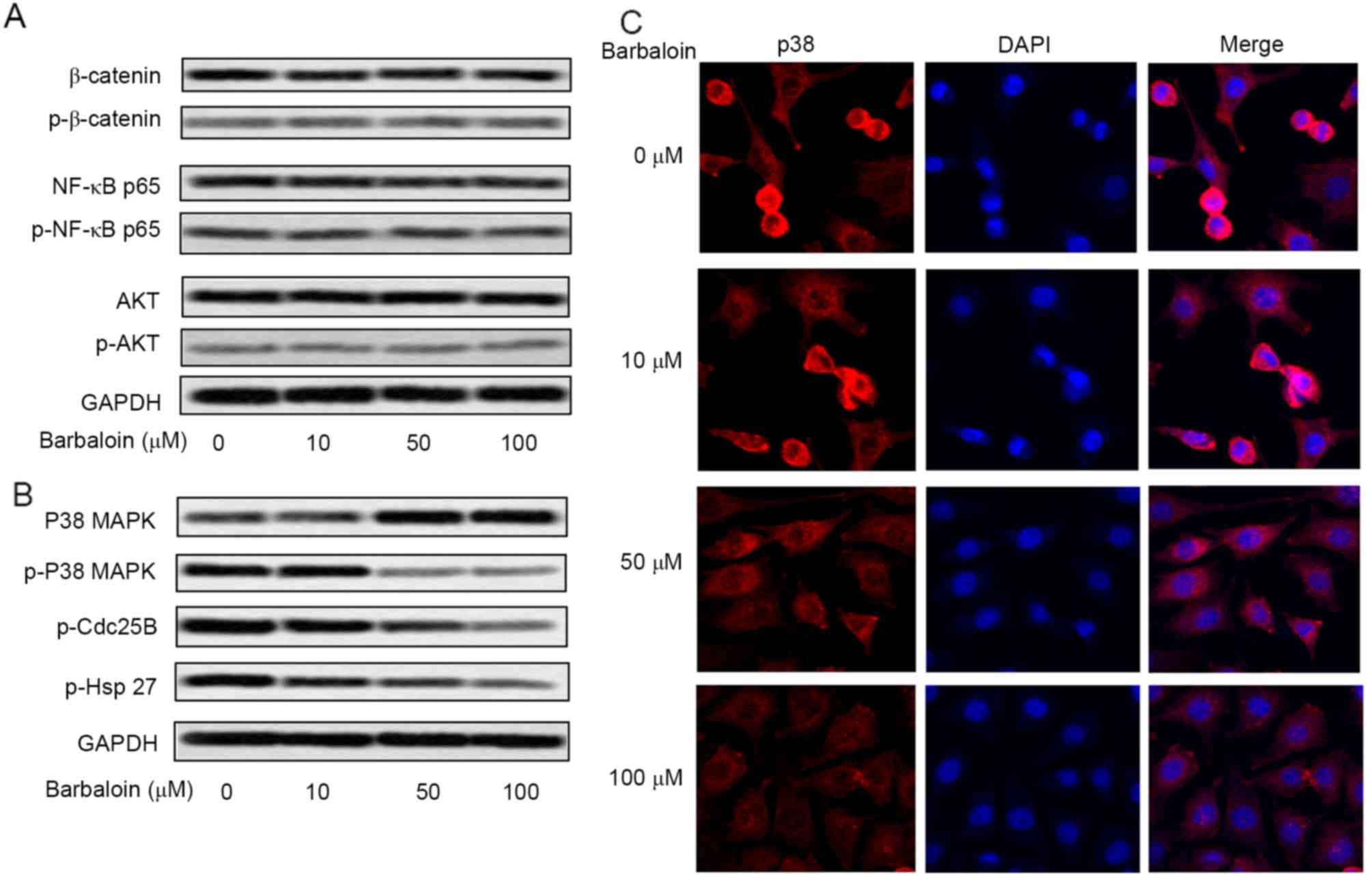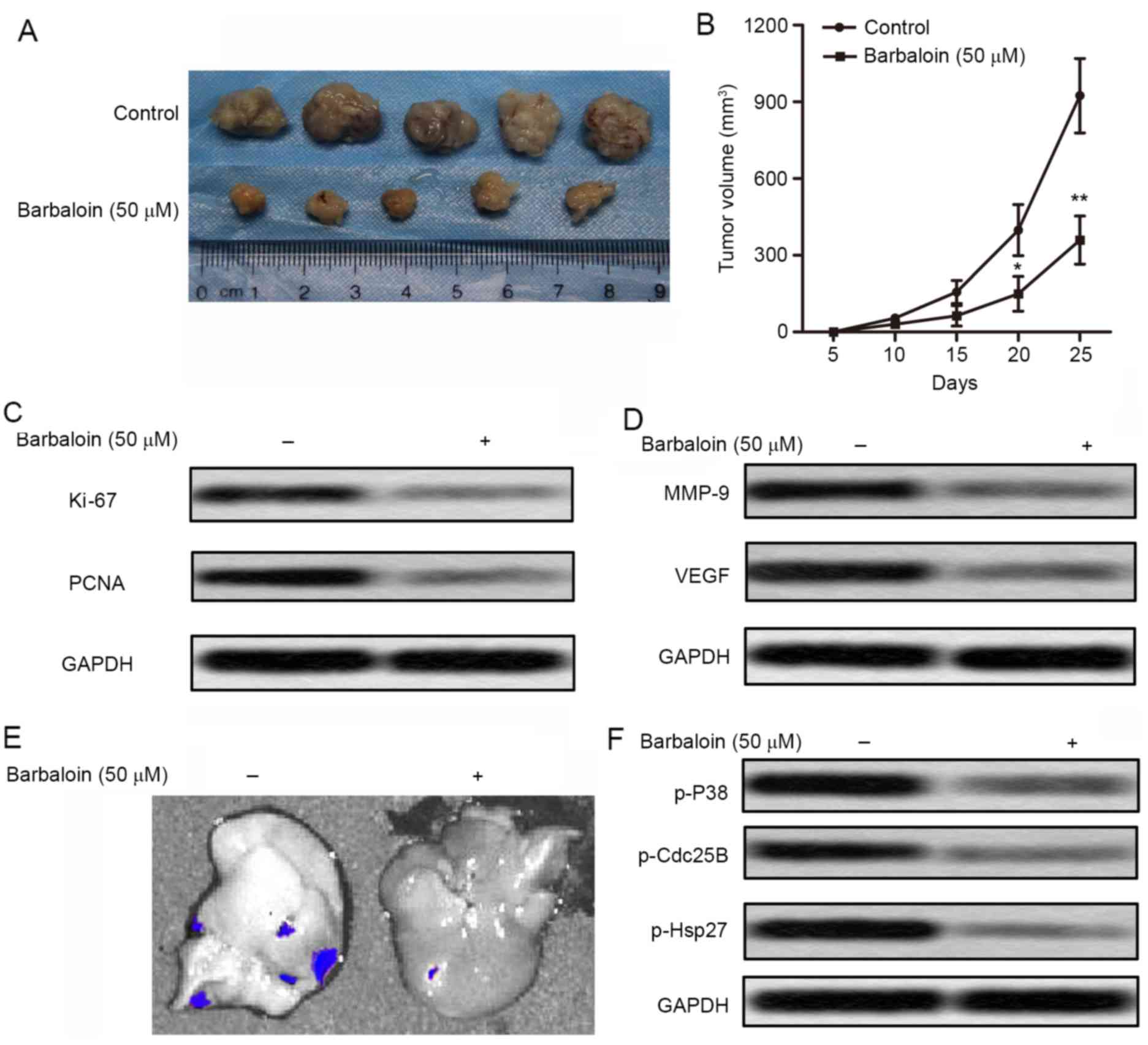|
1
|
Zhang BY, Wang YM, Gong H, Zhao H, Lv XY,
Yuan GH and Han SR: Isorhamnetin flavonoid synergistically enhances
the anticancer activity and apoptosis induction by cis-platin and
carboplatin in non-small cell lung carcinoma (NSCLC). Int J Clin
Exp Pathol. 8:25–37. 2015.PubMed/NCBI
|
|
2
|
Verdecchia A, Francisci S, Brenner H,
Gatta G, Micheli A, Mangone L and Kunkler I: EUROCARE-4 Working
Group: Recent cancer survival in Europe: A 2000–02 period analysis
of EUROCARE-4 data. Lancet Oncol. 8:784–796. 2007. View Article : Google Scholar : PubMed/NCBI
|
|
3
|
DArcangelo M and Hirsch FR: Clinical and
comparative utility of afatinib in non-small cell lung cancer.
Biologics. 8:183–192. 2014.PubMed/NCBI
|
|
4
|
Jemal A, Siegel R, Xu J and Ward E: Cancer
statistics, 2010. CA Cancer J Clin. 60:277–300. 2010. View Article : Google Scholar : PubMed/NCBI
|
|
5
|
Asamura H, Chansky K, Crowley J, Goldstraw
P, Rusch VW, Vansteenkiste JF, Watanabe H, Wu YL, Zielinski M, Ball
D and Rami-Porta R: International Association for the Study of Lung
Cancer Staging and Prognostic Factors Committee, Advisory Board
Members, and Participating Institutions: The International
Association for the Study of Lung Cancer Lung Cancer Staging
Project: Proposals for the Revision of the N Descriptors in the
Forthcoming 8th Edition of the TNM Classification for Lung Cancer.
J Thorac Oncol. 10:1675–1684. 2015. View Article : Google Scholar : PubMed/NCBI
|
|
6
|
Avelino CU, Cardoso RM, Aguiar SS and
Silva MJ: Assessment of quality of life in patients with advanced
non-small cell lung carcinoma treated with a combination of
carboplatin and paclitaxel. J Bras Pneumol. 41:133–142. 2015.
View Article : Google Scholar : PubMed/NCBI
|
|
7
|
Waller DA: Neoadjuvant chemotherapy in non
small cell lung cancer-the UK experience. Lung Cancer. 34:(Suppl
3). S31–S33. 2001. View Article : Google Scholar : PubMed/NCBI
|
|
8
|
Azim HA Jr and Ganti AK: Treatment options
for relapsed small-cell lung cancer. Anticancer Drugs. 18:255–261.
2007. View Article : Google Scholar : PubMed/NCBI
|
|
9
|
Tabolacci C, Rossi S, Lentini A,
Provenzano B, Turcano L, Facchiano F and Beninati S: Aloin enhances
cisplatin antineoplastic activity in B16-F10 melanoma cells by
transglutaminase-induced differentiation. Amino Acids. 44:293–300.
2013. View Article : Google Scholar : PubMed/NCBI
|
|
10
|
Pan Q, Pan H, Lou H, Xu Y and Tian L:
Inhibition of the angiogenesis and growth of Aloin in human
colorectal cancer in vitro and in vivo. Cancer Cell Int. 13:692013.
View Article : Google Scholar : PubMed/NCBI
|
|
11
|
Esmat AY, Tomasetto C and Rio MC:
Cytotoxicity of a natural anthraquinone (Aloin) against human
breast cancer cell lines with and without ErbB-2: Topoisomerase
IIalpha coamplification. Cancer Biol Ther. 5:97–103. 2006.
View Article : Google Scholar : PubMed/NCBI
|
|
12
|
Esmat AY, El-Gerzawy SM and Rafaat A: DNA
ploidy and S phase fraction of breast and ovarian tumor cells
treated with a natural anthracycline analog (aloin). Cancer Biol
Ther. 4:108–112. 2005. View Article : Google Scholar : PubMed/NCBI
|
|
13
|
Nićiforović A, Adzić M, Spasić SD and
Radojcić MB: Antitumor effects of a natural anthracycline analog
(Aloin) involve altered activity of antioxidant enzymes in HeLaS3
cells. Cancer Biol Ther. 6:1200–1205. 2007. View Article : Google Scholar : PubMed/NCBI
|
|
14
|
He ZH, Huang YQ, Weng SF, Tan YR, He TP,
Qin YM and Liang NC: Effect of Aloe emodin on invasion and
metastasis of high metastatic breast cancer MDA-MB-231 cells. Zhong
Yao Cai. 36:1481–1485. 2013.(In Chinese). PubMed/NCBI
|
|
15
|
He TP, Yan WH, Mo LE and Liang NC:
Inhibitory effect of aloe-emodin on metastasis potential in
HO-8910PM cell line. J Asian Nat Prod Res. 10:383–390. 2008.
View Article : Google Scholar : PubMed/NCBI
|
|
16
|
Lin ML, Lu YC, Chung JG, Wang SG, Lin HT,
Kang SE, Tang CH, Ko JL and Chen SS: Down-regulation of MMP-2
through the p38 MAPK-NF-kappaB-dependent pathway by aloe-emodin
leads to inhibition of nasopharyngeal carcinoma cell invasion. Mol
Carcinog. 49:783–797. 2010.PubMed/NCBI
|
|
17
|
Yeh FT, Wu CH and Lee HZ: Signaling
pathway for aloe-emodin-induced apoptosis in human H460 lung
nonsmall carcinoma cell. Int J Cancer. 106:26–33. 2003. View Article : Google Scholar : PubMed/NCBI
|
|
18
|
He H, Zheng L, Sun YP, Zhang GW and Yue
ZG: Steroidal saponins from Paris polyphylla suppress adhesion,
migration and invasion of human lung cancer A549 cells via
down-regulating MMP-2 and MMP-9. Asian Pac J Cancer Prev.
15:10911–10916. 2014. View Article : Google Scholar : PubMed/NCBI
|
|
19
|
Mou H, Zheng Y, Zhao P, Bao H, Fang W and
Xu N: Celastrol induces apoptosis in non-small-cell lung cancer
A549 cells through activation of mitochondria- and
Fas/FasL-mediated pathways. Toxicol In Vitro. 25:1027–1032. 2011.
View Article : Google Scholar : PubMed/NCBI
|
|
20
|
Fei F, Li X, Xu L, Li D, Zhang Z, Guo X,
Yang H, Chen Z and Xing J: CD147-CD98hc complex contributes to poor
prognosis of non-small cell lung cancer patients through promoting
cell proliferation via the PI3K/Akt signaling pathway. Ann Surg
Oncol. 21:4359–4368. 2014. View Article : Google Scholar : PubMed/NCBI
|
|
21
|
Gastonguay A, Berg T, Hauser AD, Schuld N,
Lorimer E and Williams CL: The role of Rac1 in the regulation of
NF-κB activity, cell proliferation, and cell migration in non-small
cell lung carcinoma. Cancer Biol Ther. 13:647–656. 2012. View Article : Google Scholar : PubMed/NCBI
|
|
22
|
Chien ST, Lin SS, Wang CK, Lee YB, Chen
KS, Fong Y and Shih YW: Acacetin inhibits the invasion and
migration of human non-small cell lung cancer A549 cells by
suppressing the p38α MAPK signaling pathway. Mol Cell Biochem.
350:135–148. 2011. View Article : Google Scholar : PubMed/NCBI
|
|
23
|
Miao Y, Wang L, Zhang X, Xu X, Jiang G,
Fan C, Liu Y, Lin X, Yu J, Zhang Y, et al: Promoter
methylation-mediated silencing of β-catenin enhances invasiveness
of non-small cell lung cancer and predicts adverse prognosis. PLoS
One. 9:e1122582014. View Article : Google Scholar : PubMed/NCBI
|
|
24
|
McGuire S: World Cancer Report 2014.
Geneva, Switzerland: World Health Organization, International
Agency for Research on Cancer, WHO Press, 2015. Adv Nutr.
7:418–419. 2016. View Article : Google Scholar : PubMed/NCBI
|
|
25
|
Zhang J, Chen SF, Zhen Y, Xiang J, Wu C,
Bao P, Luketich J, Hu H, Zhou X, Zhang J, et al: Multicenter
analysis of lung cancer patients younger than 45 years in Shanghai.
Cancer. 116:3656–3662. 2010. View Article : Google Scholar : PubMed/NCBI
|
|
26
|
Min J, Huang K, Tang H, Ding X, Qi C, Qin
X and Xu Z: Phloretin induces apoptosis of non-small cell lung
carcinoma A549 cells via JNK1/2 and p38 MAPK pathways. Oncol Rep.
34:2871–2879. 2015.PubMed/NCBI
|
|
27
|
Tan C, Qian X, Jia R, Wu M and Liang Z:
Matrine induction of reactive oxygen species activates p38 leading
to caspase-dependent cell apoptosis in non-small cell lung cancer
cells. Oncol Rep. 30:2529–2535. 2013.PubMed/NCBI
|
|
28
|
Lissoni P, Rovelli F, Brivio F, Zago R,
Colciago M, Messina G, Mora A and Porro G: A randomized study of
chemotherapy versus biochemotherapy with chemotherapy plus Aloe
arborescens in patients with metastatic cancer. In Vivo.
23:171–175. 2009.PubMed/NCBI
|
|
29
|
Ismail S, Haris K, Ghani Abdul AR,
Abdullah JM, Johan MF and Yusoff Mohamed AA: Enhanced induction of
cell cycle arrest and apoptosis via the mitochondrial membrane
potential disruption in human U87 malignant glioma cells by aloe
emodin. J Asian Nat Prod Res. 15:1003–1012. 2013. View Article : Google Scholar : PubMed/NCBI
|
|
30
|
Yang M, Li L, Heo SM and Soh Y:
Aloe-emodin induces chondrogenic differentiation of ATDC5 cells via
MAP kinases and BMP-2 signaling pathways. Biomol Ther (Seoul).
24:395–401. 2016. View Article : Google Scholar : PubMed/NCBI
|
|
31
|
Liu K, Park C, Li S, Lee KW, Liu H, He L,
Soung NK, Ahn JS, Bode AM, Dong Z, et al: Aloe-emodin suppresses
prostate cancer by targeting the mTOR complex 2. Carcinogenesis.
33:1406–1411. 2012. View Article : Google Scholar : PubMed/NCBI
|
|
32
|
Ma JW, Hung CM, Lin YC, Ho CT, Kao JY and
Way TD: Aloe-emodin inhibits HER-2 expression through the
downregulation of Y-box binding protein-1 in HER-2-overexpressing
human breast cancer cells. Oncotarget. 7:58915–58930.
2016.PubMed/NCBI
|
|
33
|
Tabolacci C, Lentini A, Mattioli P,
Provenzano B, Oliverio S, Carlomosti F and Beninati S: Antitumor
properties of aloe-emodin and induction of transglutaminase 2
activity in B16-F10 melanoma cells. Life Sci. 87:316–324. 2010.
View Article : Google Scholar : PubMed/NCBI
|



















